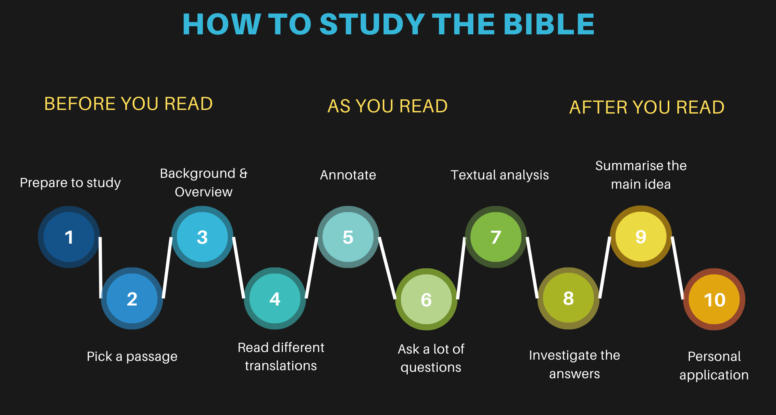
How to Study the Bible
10 Steps to Bible Study
BEFORE YOU READ:
-
Prepare to study:
-
-
-
- Schedule your Bible study time to be free of distractions & interruptions
- Gather the right tools (Bible & computer or Study Bible, journal, etc.)
- Prepare your heart by praying for the Holy Spirit to give you the right attitude and to help you understand
-
-
-
Pick a passage to study
-
-
-
- If you’re starting out for the first time, start with Book of John, or one of the other Gospel books Matthew, Mark or Luke
- You can also pick by topic / genre:
-
-
- Genesis for the origin stories of creation, sin, and the patriarchs
- Exodus – Deuteronomy for laws, sanctuary system & establishment of nation of Israel
- Joshua – Esther for narrative history of the Israelite nation
- Job – Song of Songs for poetry / wisdom literature
- Isaiah – Malachi for prophecy / social justice
- Matthew – John to learn about Jesus and His teachings
- Acts for the history of the Early Church
- Romans – Jude to read instructions to the early Christians & formation of doctrines
- Revelation for end-time prophecies
-
-
- Or you can follow a Bible character
- Read one story / passage rather than a whole chapter – some Bibles have headings the translators put in to break the chapters into smaller passages.
-
-
-
Get a broad overview of the book
-
-
-
- Watch an intro video about the Bible book : https://bibleproject.com/explore/book-overviews
- Or read the introductions to each book: https://www.blueletterbible.org/resources/intros.cfm
- Or get a really good Study Bible that has the introductions to each book – my favourite one is the Andrews Study Bible, which you can order from the Adventist Book Centre.
-
-
AS YOU READ:
-
Read the passage in different translations
-
-
-
- These Bibles are available online for free https://www.biblegateway.com
- Make sure to read versions that were translated from the original Hebrew, Greek and Aramaic and made after the discovery of the Dead Sea Scrolls – for example:
-
-
- New International Version (NIV)
- Common English Bible (CEB)
- New English Translation (NET)
-
-
- You can also read NASB, NKJV, and The Message to get literal or paraphrased translations
- If you know other languages, read it in different languages as well to get a fuller translation because some languages have words that are closer translations to the original meaning of the ancient Greek, Hebrew, and Aramaic
-
-
-
Annotate as you read
-
-
-
- Circle key words or phrases that you want to explore
- Highlight / underline main ideas
- Question marks for what you don’t understand
- Exclamation point for things that surprise you
- Asterisk for what you want to remember
- Arrow for when you make a connection to another idea or experience
- Write “Ex” for examples
- Draw a picture / diagram / chart / symbol
-
-
-
Ask a lot of questions
-
-
-
- What is the historical / cultural context for this passage?
- What is the literary context for this passage?
- How does God interact with each of the characters?
- Is there anything in the passage that is unusual or interesting?
-
-
-
Do textual analysis
-
-
-
- Look for repeated words or phrases, themes, motifs, plots, characters, etc.
- Notice shifts to direct discourse – they are often the heart of the story (things in direct quotation)
- Read the story from each point of view, imagine the sounds/smells/sights/touch
- Pay attention to what is said as well as what is not said that you’d normally expect
- What comes before & after this passage? Read the chapter before & after to see the literary context
- Do a word study, exploring its possible meaning and use (www.blueletterbible.org)
-
-
AFTER YOU READ:
-
Investigate answers to the questions
-
-
- Commentaries, maps, dictionaries:
-
- https://www.blueletterbible.org/study.cfm
- https://absg.adventist.org/archives
- Study Bible notes
- SDA Bible Commentaries
- NIV Application Commentaries
-
- Concordances
-
- Search for words in www.blueletterbible.org or www.biblegateway.com
-
- Cross-references
-
- www.blueletterbible.org
- www.biblegateway.com
- Study Bibles
-
- Archeology
- Commentaries, maps, dictionaries:
-
-
Summarise the main idea
-
-
-
- Summarise the passage in your own words
- What is the main idea / principle?
-
-
-
Personal application
-
-
-
- Ask, what message is God telling me today through this passage?
- Journal, reflect, and pray, asking God to help you live out what He has revealed
- Share what you learned with others
-
-
by: Jinha Kim
"But those who drink the water I give them will never thirst. Indeed, the water I give them will become in them a spring of water welling up to eternal life." John 4:14
